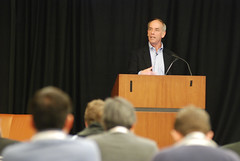 Before I give you my two cents on this particular session, here are links to two articles that describe the session pretty well:
Before I give you my two cents on this particular session, here are links to two articles that describe the session pretty well:
- BEA Panel Suggests Publishers Still Clueless about Library E-Books and Piracy
- BEA 2013: Is E-book Lending Good for Authors?
Panelists included:
- Ginger Clark, Moderator – Literary Agent, Curtis Brown LTD
- Jack Perry, Owner, 38enso Inc.
- Maureen Sullivan, President, American Library Association (ALA)
- Paul Aiken, Executive Director, Authors Guild
- Steve Potash, President and CEO, Overdrive
- Carolyn Reidy, president and CEO of Simon & Schuster
I have to admit – I didn’t really take notes for this session (but probably should have). Mostly, I just sat, listening in amazement as someone on the publisher side of things would say something silly, and then Mareen and Steve would correct that person. Then during Q&A time, the moderator would blow off questions by answering them herself, then quickly moving on to another question. It was that kind of session.
The thing that got to me the most was this: Carolyn Reidy, CEO of a huge publishing house, sounded like someone who was attempting to talk knowledgeably about ebooks in libraries … but hadn’t ever actually used a library card to download an ebook (which was kinda funny, since she was sitting right next to Steve Potash of Overdrive).
At one point, Carolyn basically said the danger of ebooks in libraries is that a customer can sit at home and download every book they ever wanted … huh? She and Paul Aiken seemed to think that’s how the library ebook check-out process works.
That’s simply wrong, of course. Steve and Maureen corrected them. As did a few people in the audience.
Carolyn also said that her publishing house was doing the ebook pilot project because … no research has ever been done about ebooks in libraries. Again, huh? Someone please introduce Carolyn to Pew Internet and their major research project on … um … ebooks in libraries. And of course, Steve mentioned that he has 10 years of data (Overdrive’s been in the ebook business for at least that long).
I heard a similar thing at last year’s Book Expo conference, too. Executives at more than one major publishing house think libraries give ebooks away to anyone who wants them, willy-nilly, and we let them keep the ebooks forever.
And … these people aren’t stupid – they are running large, successful publishing houses.
So – here’s my question. Where is the disconnect, and how can we fix this?
Argh.
ebook photo by shiftstigma
 I’m headed to
I’m headed to  One more set of sketchy notes from ALAMW13 – this time from Lee Rainie, director, Pew Research Center’s Internet & American Life Project
One more set of sketchy notes from ALAMW13 – this time from Lee Rainie, director, Pew Research Center’s Internet & American Life Project